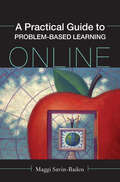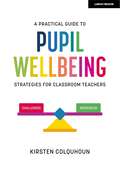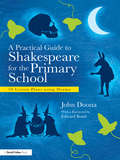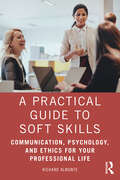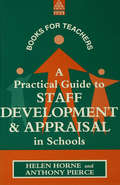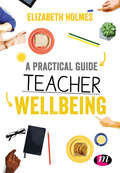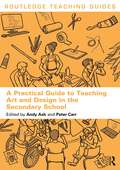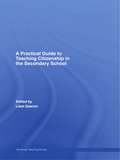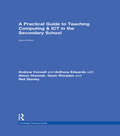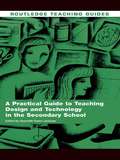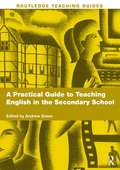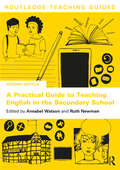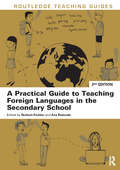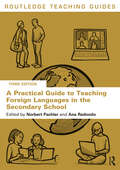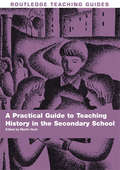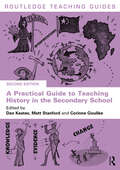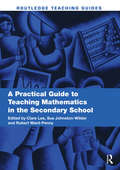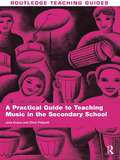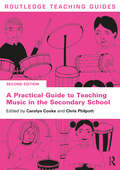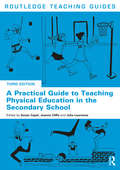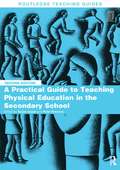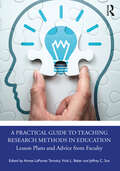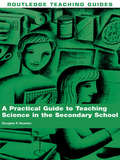- Table View
- List View
A Practical Guide to Problem-Based Learning Online
by Maggi Savin-BadenProblem-based learning online is a burgeoning area, crying out for support in all the disciplines, but particularly health, medicine, education and social care that are already advanced users of problem-based learning in higher education. This book provides highly grounded research based ways for those wanting to change problem-based learning modules and programs from face to face to online approaches, as well as those who have developed e-learning components but who want to adopt problem-based methods. Providing an overview of the current state of problem based learning online, it examines why we're moving from fact to face to online provision, considers existing forms of provision, outlines common mistakes and strategies to avoid future problems, and shows how to effectively facilitate learning. Illustrated by mini case studies and examples of international projects, it provides guidance on effective design, online collaboration and group dynamics, and explores the common, and complex, decisions faced when choosing which form of problem-based learning to adopt. Including practical information and resources for games and activities, scenarios of problem-based learning in the different disciplines, advice for supporting staff and students, and effectively evaluating the tools, skills and pedagogy needed for learning, this book is an essential guide for all practitioners involved in the design and delivery of problem based learning online.
A Practical Guide to Pupil Wellbeing: Strategies for classroom teachers
by Kirsten ColquhounEvery year thousands of research papers, guidance documents and educational aims are published on pupil mental health and wellbeing. Many of them offer insightful ideas and theories, but what is often lacking is a clear route for busy classroom teachers to apply these findings. A focus on wellbeing is here to stay, but what does it mean? How does it apply to the curriculum? And what is a teacher's role? This book critically explores the importance of being a research-informed teacher, assesses some of the key health and wellbeing areas that class teachers can directly affect, and offers practical advice on how to do this. Designed in part to create a clearer pathway for classroom teachers to ensure that, while already spinning their many existing plates, the health and wellbeing needs of their pupils can be met effectively.Teaching, like healthcare, has infinite capabilities to contribute to social improvement both for the individual and wider society. Teachers go above and beyond their job description every single day and face a myriad of challenges in doing so. This book will help to arm class teachers with a toolkit of information to help them succeed as teachers of health and wellbeing.
A Practical Guide to Pupil Wellbeing: Strategies for classroom teachers
by Kirsten ColquhounEvery year thousands of research papers, guidance documents and educational aims are published on pupil mental health and wellbeing. Many of them offer insightful ideas and theories, but what is often lacking is a clear route for busy classroom teachers to apply these findings. A focus on wellbeing is here to stay, but what does it mean? How does it apply to the curriculum? And what is a teacher's role? This book critically explores the importance of being a research-informed teacher, assesses some of the key health and wellbeing areas that class teachers can directly affect, and offers practical advice on how to do this. Designed in part to create a clearer pathway for classroom teachers to ensure that, while already spinning their many existing plates, the health and wellbeing needs of their pupils can be met effectively.Teaching, like healthcare, has infinite capabilities to contribute to social improvement both for the individual and wider society. Teachers go above and beyond their job description every single day and face a myriad of challenges in doing so. This book will help to arm class teachers with a toolkit of information to help them succeed as teachers of health and wellbeing.
A Practical Guide to Shakespeare for the Primary School: 50 Lesson Plans using Drama
by John DoonaShakespeare is one of our key historical figures but so often he remains locked behind glass and hard to reach. The purpose of this book is to unlock Shakespeare, to remove the tag of ‘high art’ that has surrounded his work and return him to the heart of popular culture where his plays began in the first place. In his foreword, playwright Edward Bond says of A Practical Guide to Shakespeare for the Primary School, ‘It is written with knowledge and experience of its subject – but also with the knowledge of the young people with whom that experience was shared‘. John Doona will inspire and motivate pupils and teachers alike to engage with Shakespeare in a fresh and accessible manner and provide clear, tried and tested schemes of work which demonstrate how engagement with the plays and their language can have a dramatic impact on children’s literacy and writing. As well as providing practical guidance to classroom delivery and performance, techniques, approaches and attitudes, this handbook also promotes learning outcomes linked to literacy targets and cross-curricular units of learning. The central chapters of the book form a comprehensive cross-curricular unit of work on four specific plays – The Tempest, Macbeth, A Midsummer Night’s Dream and Romeo and Juliet – providing background notes and historical facts linked to the plays, along with comprehensive schemes of work for immediate implementation and ideas for generating performance. Features unique to this resource include:- Free electronic ‘info-blasts’ to all book buyers containing electronic versions of key elements of the book as well as additional resources and lesson plans Drama for the Petrified - A crash course for teachers in the techniques, approaches and attitudes required to bring Shakespeare to life A chapter on Shakespeare and his life, including ‘Five minute Will’ a short comic scripted account of his life Comprehensive schemes of work, each including a Teachers’ Crib Sheet, Story Whoosh!, Story Jigsaw, Scheme Structure Map, edited scenes and additional classroom resources A Practical Guide to Shakespeare for the Primary School is an essential resource for all primary teachers, trainee teachers and drama practitioners, offering guidance, insight and compelling schemes of work for the study of Shakespeare through drama in the primary classroom.
A Practical Guide to Soft Skills: Communication, Psychology, and Ethics for Your Professional Life
by Richard AlmonteThis accessible text looks at the range of soft skills sought after by employers and provides a practical guide to developing and effectively demonstrating these skills. Soft skills -- including communication, customer service, teamwork, problem solving, and personal management -- represent a major component of any worker's professional identity. This book analyzes major soft skills, including both inward-facing soft skills (how workers manage themselves to effectively perform their work) and outward-facing skills (how workers effectively interact with others and in groups). It explores how these skills are rooted in fundamental areas of liberal arts including interpersonal communication, psychology, and ethics. It provides an active learning pedagogy, including creative exercises and case studies through which students can assess their understanding of underlying concepts and their application in real-world situations. The book can be used as a supplement for communication, business, and career-oriented courses, and it will be of interest to individual students and junior professionals as well as career counselors, postsecondary instructors across the curriculum, and professionals in human resources and learning and development.
A Practical Guide to Staff Development and Appraisal in Schools (Books For Teachers Ser.)
by Horne, Helen Pierce, AnthonyThis guide contains an overview of existing successful appraisal practices and practical suggestions for both those managing and undertaking appraisal. The book takes into account up-to-date policies and changes in appraisal.
A Practical Guide to Teacher Wellbeing: A practical guide
by Elizabeth HolmesTeacher wellbeing, or a lack of it, is a major concern for the teaching profession. Research shows that there is a recruitment and retention crisis with over a third of the school, FE and HE profession expecting to leave by 2020. This is a practical guide that will help trainee teachers prepare for what is, undoubtedly, a demanding job. It supports new teachers to be aware of themselves and to understand the schools and teaching sector so they better anticipate pressures and find their own way forward. With solutions and strategies that can be taken into practice, this guide will help new and early career teachers establish that all-important work/life balance and avoid burn out.
A Practical Guide to Teacher Wellbeing: A practical guide
by Elizabeth HolmesTeacher wellbeing, or a lack of it, is a major concern for the teaching profession. Research shows that there is a recruitment and retention crisis with over a third of the school, FE and HE profession expecting to leave by 2020. This is a practical guide that will help trainee teachers prepare for what is, undoubtedly, a demanding job. It supports new teachers to be aware of themselves and to understand the schools and teaching sector so they better anticipate pressures and find their own way forward. With solutions and strategies that can be taken into practice, this guide will help new and early career teachers establish that all-important work/life balance and avoid burn out.
A Practical Guide to Teaching Art and Design in the Secondary School (Routledge Teaching Guides)
by Peter Carr Andy AshA Practical Guide to Teaching Art and Design in the Secondary School bridges the gap between key themes in Art and Design education theory, professional practice and the classroom. This practical and accessible book introduces methods for the delivery of engaging Art and Design lessons that safely and meaningfully address the current key issues in the subject.Each chapter includes tasks to support trainee and early career teachers in implementing, reviewing and adapting their teaching. Chapters cover a range of core approaches to the curriculum such as powerful knowledge for the Art and Design teacher, the place of Art History in the curriculum and critical thinking in Art and Design learning. In addition, emerging cultural and political issues (such as decolonising the Art and Design curriculum, gender and sexuality, anti-ablism, sustainability and well-being) are explored in ways designed to guide teachers towards applying their own unique teaching style.Linking directly to the planning and delivery of the subject in Key Stages 3, 4 and 5, the book is divided into three sections: Imaginative Curiosity for the Art and Design Teacher Epistemological Curiosity for Teachers and Learners Critical Curiosity in the Art and Design Classroom Designed to be used independently or alongside the essential textbook Learning to Teach Art and Design in the Secondary School, this book is packed with practical strategies, teaching ideas and activities in every chapter. The book provides everything trainee and early career teachers need to reflect on and develop their teaching practice, helping them to plan lessons across the subject in a variety of teaching situations.
A Practical Guide to Teaching Citizenship in the Secondary School (Routledge Teaching Guides)
by Liam GearonIdeal for students and NQTs, this practical and accessible workbook is designed to develop basic teaching skills, and increase teachers’ knowledge and understanding of teaching citizenship. Filled with practical activities and materials to encourage users to analyze their own learning and performance and underpinned with research findings, this personal workbook can be written in directly to provide a useful record of progress. It also includes case studies, examples of current good practice and a range of tried-and-tested strategies for inspiration and guidance. Complementing Learning to Teach Citizenship in the Secondary School, this workbook can be used as part of an integrated course or independently as a standalone self-study book.
A Practical Guide to Teaching Computing and ICT in the Secondary School (Routledge Teaching Guides)
by Andrew Connell Neil Stanley Anthony Edwards Alison Hramiak Gavin RhoadesA Practical Guide to Teaching Computing and ICT in the Secondary School offers straightforward guidance and inspiration to support all trainee and newly qualified teachers, as well as their tutors and mentors. It will also be a source of support and ideas for qualified teachers who wish to develop their teaching of Computing as a subject, in light of recent changes to the National Curriculum. Grounded in the best research and practice available, it focuses on the key pedagogical issues which arise during teacher training and offers stimulating activities based on tried and tested strategies. Comprehensively updated and restructured to reflect recent changes in the curriculum, Initial Teacher Training Standards and classroom technologies, it covers key aspects of Computing and ICT teaching: Planning pupil learning and progression Managing the learning environment Using assessment to improve pupil learning and your own teaching Developing pupils’ understanding of key concepts and ideas in Computing, including Computational Thinking and Programming Pupils’ common misconceptions and how to avoid them Helping pupils appreciate good and bad effects of computing. A Practical Guide to Teaching Computing and ICT in the Secondary School, written by experts in the field, provides detailed examples of theory in practice, enabling you to analyse and reflect on your own teaching in order to ensure pupil learning is maximised.
A Practical Guide to Teaching Design and Technology in the Secondary School
by Gwyneth Owen-JacksonContaining a wealth of practical activities and materials that provide excellent opportunities to analyse learning and performance within Design and Technology, this book also includes case studies and examples of existing good practice and a range of tried-and-tested strategies. Specially designed to be written in directly it provides a useful record of progress and is accompanied by a Companion Website. Designed to be used by student teachers, NQTs and beginning teachers, this workbook covers each main specialist area of Design Technology: electronics and communications technology (ECT), food technology, materials technology and textiles technology. Topics covered include: design and technology in the school curriculum the importance of health and safety the use of ICT in the teaching of design and technology planning lessons managing the classroom assessment issues the integration of literacy, numeracy, citizenship and sustainability into design and technology your own professional development. This book complements the market-leading textbook Learning to Teach Design and Technology in the Secondary School (also published by Routledge), but can also be used equally successfully on its own.
A Practical Guide to Teaching English in the Secondary School
by Andrew GreenA Practical Guide to Teaching English in the Secondary School offers straightforward advice, inspiration and support for all training and newly qualified secondary English teachers. Based on the best research and practice available, it offers a wide range of tried and tested strategies and practical activities to ensure success in the secondary classroom. Illustrated throughout with examples of good practice and activities to promote careful thought, the Practical Guide covers key aspects of English teaching, including: Effective lesson planning and pupil progress Getting started with drama Teaching poetry successfully and enjoyably Media education and media studies - an introduction to the curriculum and designing schemes of work Teaching English Language Choosing and using fiction for all ages English Literature at A Level Opportunities for ICT in English Planning meaningful assessment. A Practical Guide to Teaching English in the Secondary School is an essential companion to the best selling Learning to Teach English in the Secondary School. Written by expert professionals, it provides detailed examples of theory in practice, enabling you to analyse and reflect on your own teaching in order to ensure pupil learning is maximised. Providing a combination of practical ideas, educational rationales and activities to stimulate personal thought and development, this book explores a wide range of issues pertinent to the teaching and learning of English in the 21st century.
A Practical Guide to Teaching English in the Secondary School (Routledge Teaching Guides)
by Annabel WatsonA Practical Guide to Teaching English in the Secondary School offers straightforward advice, inspiration and a wide range of tried and tested approaches to help you find success in the secondary English classroom. Covering all aspects of English teaching, it is designed for you to dip in and out of, and enable you to focus on specific areas of teaching, your programme or pupils’ learning. Fully updated to reflect what student and early career teachers see and experience when they enter the classroom, the second edition supports trainee and practicing teachers to teach in imaginative and creative ways to promote learning in English. Packed with ideas, resources, practical teaching activities and underpinned by the latest research into how children learn, the book examines the core areas of reading, writing and spoken English including: • Plays, poetry, non-fiction, myths and legends, drama and Shakespeare • Developing writing • Creative grammar • Talk and classroom dialogue • Media and digital writing • English across the curriculum • Well-being through writing • Literature and language post-16. Including tools to support critical reflection, A Practical Guide to Teaching English in the Secondary School is an essential companion for all training and newly qualified English teachers.
A Practical Guide to Teaching Foreign Languages in the Secondary School
by Norbert Pachler Ana RedondoHow can you effectively motivate young people to engage with foreign language learning? How can young people engage with new ideas and cultural experiences within and outside the classroom? The new edition of A Practical Guide to Teaching Foreign Languages in the Secondary School offers straightforward advice and inspiration for training teachers, NQTs and teachers in their early professional development. Written by a team of expert professionals, it offers a wide range of strategies for successful teaching in the languages classroom. Key topics covered include: Helping pupils develop better listening skills Effective speaking activities Choosing the best texts and technology for reading skills Teaching grammar Internet tools and services for teaching and learning Integrating formative assessment The intercultural dimension of language teaching Collaborating with primary schools and successful transition Teaching Arabic and Mandarin Working with TAs and FLAs Classroom research and reflective practice This fully revised and updated second edition includes new chapters on homework, motivation and less widely taught languages, while the core sections on reading and writing, planning, and culture and diversity have been significantly updated to reflect important changes in research, practice and policy. A Practical Guide to Teaching Foreign Languages in the Secondary School extends the popular Learning to Teach Foreign Languages in the Secondary School by providing detailed examples of theory in practice, based on the most up-to-date research and practice, as well as links to relevant sources supporting evidence-informed practice. ?It is an essential compendium of support and ideas for all those embarking upon their first steps in a successful career in teaching foreign languages.
A Practical Guide to Teaching Foreign Languages in the Secondary School (Routledge Teaching Guides)
by Norbert Pachler Ana RedondoHow can you effectively motivate young people to engage with foreign language learning? How can young people engage with new ideas and cultural experiences within and outside the classroom? The new and fully revised edition of A Practical Guide to Teaching Foreign Languages in the Secondary School offers straightforward advice and inspiration for training teachers, newly qualified teachers (NQTs) and teachers in their early professional development. Offering a wide range of strategies for successful teaching in the languages classroom, this third edition includes separate chapters on the core skills of reading, writing, speaking and listening and new chapters on pronunciation and the science of learning. The chapters provide detailed examples of theory in practice, based on the most up-to-date research and practice, as well as links to relevant sources supporting evidence-informed practice and cover: Strategies for planning engaging lessons Integrating formative and summative assessment Digital tools and services for teaching and learning Helping pupils develop better listening skills Effective speaking activities The role of scaffolds and models in developing writing skills Teaching grammar The intercultural dimension of language teaching The role of multilingualism in foreign language education Engaging with critical pedagogy A Practical Guide to Teaching Foreign Languages in the Secondary School is an essential compendium of support and ideas for all those embarking upon their first steps in a successful career in teaching foreign languages.
A Practical Guide to Teaching History in the Secondary School
by Martin HuntThis practical workbook contains all the advice, guidance and resources new and student history teachers need to reflect on and develop their teaching practice, helping them to plan lessons across the subject in a variety of teaching situations. Helpful features include: case studies examples of pupils’ work examples of existing good practice a range of tried-and-tested teaching strategies photocopiable resources and training materials activities in each chapter to help student history teachers analyze their learning and performance web links for further reading on evidence-based practice. Designed to be used independently or as an integrated extension of the popular textbook, Learning to Teach History in the Secondary School which provides detailed examples of theory in practice, this book is packed with examples of how to analyze practice to ensure maximized learning in the classroom.
A Practical Guide to Teaching History in the Secondary School (Routledge Teaching Guides)
by Dan Keates Matt Stanford Corinne GoulléeA Practical Guide to Teaching History in the Secondary School offers comprehensive advice, inspiration and a wide range of tried and tested approaches to help you find success in the secondary history classroom. Covering all aspects of history teaching, it is designed for you to dip in and out of and to enable you to focus on specific areas of teaching, your programme or pupils’ learning.This completely revised edition has been rewritten with new chapters reflecting recent work into curriculum thought, different types of historical knowledge, designing enquiry questions and decolonising the curriculum. Emphasising the importance of pedagogy, detailed subject knowledge, a well-informed and diverse curriculum, evidence-informed practice and a focus on building long-term student understanding in the subject, the chapters cover: Curriculum design Teaching causation and consequence Teaching interpretation and significance Using evidence Delivering a more inclusive and representative history curriculum Progress and assessment Packed with ideas, resources and practical teaching activities and underpinned by the latest research, this is an essential companion for all training and early career history teachers.
A Practical Guide to Teaching Mathematics in the Secondary School
by Sue Johnston-Wilder Clare Lee Robert Ward-PennyA Practical Guide to Teaching Mathematics in the Secondary School offers straightforward advice, inspiration and support for mathematics teachers whether in training or newly qualified. Based on the best research and practice available, it offers a wide range of tried and tested approaches that succeed in secondary classrooms. Each chapter contains a wealth of tasks and ideas that allow teachers to reflect on the approaches and make plans for using them in their own classrooms, and offers ideas for lesson plans, learning activities and suggested further reading and development. Illustrated throughout with case studies and practical insights from classroom observations and experience, this book covers key aspects of mathematics teaching, including: managing the class and learning environment; teaching the topics of mathematics; encouraging mathematical thinking; choosing and using resources; using multi-media technology; assessing work in mathematics. A Practical Guide to Teaching Mathematics in the Secondary School is an essential companion to the core textbook Learning to Teach Mathematics in the Secondary School. Written by expert professionals, it supports you in your development of imaginative and effective lessons on a variety of curriculum topics in different teaching situations.
A Practical Guide to Teaching Music in the Secondary School
by Julie Evans Chris PhilpottA Practical Guide to Teaching Music in the Secondary School provides valuable support, guidance and creative ideas for student teachers, mentors and practising teachers who want to develop their music teaching. Written to accompany the successful textbook Learning to Teach Music in the Secondary School, it will help you understand important current developments and explore new possibilities for teaching and learning. Focusing on teaching music musically, the book explores musical learning through placing pupils at the centre of a musical experience. Considering the revised KS3 curriculum and the 14--19 agenda in music, it also seeks to broaden the perspectives of music teachers through engaging with collaborative practice, transitions and cross-curricular work. Key issues explored include: personalising musical learning teaching creatively and promoting creativity approaches to using ICT in the classroom musical collaboration with other adults assessment for learning in music making connections with other subjects. Using practical examples and tasks, this book will help you critically examine the way in which children learn music. It is an invaluable resource for those involved in teaching music who are seeking to develop their practical and theoretical understanding.
A Practical Guide to Teaching Music in the Secondary School (Routledge Teaching Guides)
by Carolyn CookeThis updated second edition of A Practical Guide to Teaching Music in the Secondary School provides valuable support, guidance and creative new ideas for students and practising teachers who want to develop their music teaching practice. Written to accompany the successful textbook Learning to Teach Music in the Secondary School, it explores a range of current issues, developments and opportunities within music education. The book supports the reader in undertaking practical enquiries across the breadth of the subject to support their critical reflection and the development of their own context-relevant strategies and understandings. Key themes explored include the pedagogy of: • singing; • composing; • improvising; • performing; • responding; • musical literacy; • music and cross-curricular learning. Using practical examples and reflective activities, this book will help you critically examine ways in which you can place pupils at the centre of learning music. It is an invaluable resource for those involved in teaching music who are seeking to develop their practical and theoretical understanding, whether at a trainee or practising music teacher level.
A Practical Guide to Teaching Physical Education in the Secondary School (Routledge Teaching Guides)
by Julia Lawrence Susan Capel Joanne CliffeA Practical Guide to Teaching Physical Education in the Secondary School is written for all student teachers on university and school-based initial teacher education programmes. It offers a wealth of tried and tested strategies together with practical activities and materials to support your teaching to enhance pupils’ learning. It is designed for you to dip in and out of, and enable you to focus on specific areas of teaching, your programme or pupils' learning. This third edition is fully updated with the most recent developments in teaching physical education and features five brand new chapters. Key topics covered include: Planning schemes of work, units of work and lessons Safe practice, risk assessment and risk management Promoting positive behaviour Applying theories of learning to your practice Overcoming barriers and maximising the achievement of all pupils Assessing learning Physical literacy NEW Health related learning NEW Using digital technologies NEW Reflective practice and action research Managing your workload, resilience, health and well-being NEW Working with your mentor NEW Photocopiable resources offer assistance in lesson observation, planning, preparation, teaching and evaluation. An annotated 'Further resources' section at the end of each chapter provides information about some useful additional resources to support you in your development as a teacher. Illustrated throughout with examples of existing good practice, this highly practical resource offers valuable support and guidance to all student teachers as well as those in the early years of their teaching career. Although A Practical Guide to Teaching Physical Education in the Secondary School, 3rd Edition can be used successfully on its own, it is also a companion to Learning to Teach Physical Education in the Secondary School, 5th Edition and can be used to reinforce the basic teaching skills covered in that core textbook.
A Practical Guide to Teaching Physical Education in the Secondary School (Routledge Teaching Guides)
by Susan Capel Peter BreckonA Practical Guide to Teaching Physical Education in the Secondary School is written for all student teachers on university and school-based initial teacher education courses. It offers a wealth of tried and tested strategies together with practical activities and materials to support both your teaching and your pupils’ learning. It is designed for you to dip in and out of, to enable you to focus on specific areas of teaching or foci on your course. This second edition is fully updated with the most recent research and developments in the field and includes brand new chapters. Key topics covered include: Understanding your own views about your subjectNEW Lesson planning and schemes of work Physical Education and Key Skills Using ICT Cross-curricular teaching and learningNEW Safe practice, risk assessment and risk management Applying theories of learning to your practice Helping pupils meet intended learning outcomesNEW Promoting positive behaviourNEW Overcoming barriers and maximising the achievement of all pupilsNEW Assessing learning Working with others Reflective practice and action research. Photocopiable resources offer easy assistance in lesson observation, planning, preparation, delivery and evaluation. An annotated further reading section at the end of each chapter provides advice about selection of the best resources on the web and elsewhere. Illustrated throughout with examples of existing good practice, this highly practical resource offers valuable support and inspiration to all student teachers as well as those in the early years of their teaching career. A Practical Guide to Teaching Physical Education in the Secondary School, 2nd edition is a companion to Learning to Teach Physical Education in the Secondary School, 3rd edition and can be used to reinforce the basic teaching skills covered in that core textbook. The book can also be used equally successfully on its own.
A Practical Guide to Teaching Research Methods in Education: Lesson Plans and Advice from Faculty
by Vicki L. Baker Jeffrey C. Sun Aimee LaPointe TeroskyA Practical Guide to Teaching Research Methods in Education brings together more than 60 faculty experts. The contributors share detailed lesson plans about selected research concepts or skills in education and related disciplines, as well as discussions of the intellectual preparation needed to effectively teach the lesson. Grounded in the wisdom of practice from exemplary and award-winning faculty from diverse institution types, career stages, and demographic backgrounds, this book draws on both the practical and cognitive elements of teaching educational (and related) research to students in higher education today. The book is divided into eight sections, covering the following key elements within education (and related) research: problems and research questions, literature reviews and theoretical frameworks, research design, quantitative methods, qualitative methods, mixed methods, findings and discussions, and special topics, such as student identity development, community and policy engaged research, and research dissemination. Within each section, individual chapters specifically focus on skills and perspectives needed to navigate the complexities of educational research. The concluding chapter reflects on how teachers of research also need to be learners of research, as faculty continuously strive for mastery, identity, and creativity in how they guide our next generation of knowledge producers through the research process. Undergraduate and graduate professors of education (and related) research courses, dissertation chairs/committee members, faculty development staff members, and graduate students would all benefit from the lessons and expert commentary contained in this book.
A Practical Guide to Teaching Science in the Secondary School (Routledge Teaching Guides)
by Douglas P. NewtonThis practical and accessible workbook is designed to support student teachers as they develop their basic teaching skills and increase their broader knowledge and understanding for teaching science. Newly qualified and beginning teachers should also find it useful. It contains all the advice, guidance and resources new and student science teachers need to reflect on and develop their teaching practice, helping them to plan lessons across the subject in a variety of teaching situations. Helpful features include: case studies examples of pupils’ work examples of existing good practice a range of tried-and-tested teaching strategies photocopiable resources and training materials activities in each chapter to help student history teachers analyse their learning and performance web links for further reading on evidence-based practice.
